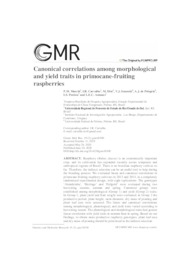Canonical correlations among morphological and yield traits in primocane-fruiting raspberries.
Canonical correlations among morphological and yield traits in primocane-fruiting raspberries.
Summary: Raspberry (Rubus idaeus) is an economically important crop, and its cultivation has expanded recently across temperate and subtropical regions of Brazil. There is no brazilian raspberry cultivar so far. Therefore, the indirect selection can be an useful tool to help during the breeding process. We evaluated linear and canonical correlations in primocane-fruiting raspberry cultivars in 2013 and 2014, in a completely randomized experimental design, with eight replications. The genotypes 'Alemãzinha', 'Heritage' and 'Fallgold' were evaluated during two harvesting seasons, autumn and spring. Canonical groups were established among morphological (Group 1) and yield (Group 2) traits. In Group 1, plant yield and fruit weight were evaluated; in Group 2 the productive period, plant height, stem diameter, dry mass of pruning and plant leaf area were assessed. The linear and canonical correlations among morphological, phenological, and yield traits varied according to harvesting season. The phenological and morphological traits had greater linear correlation with yield traits in autumn than in spring. Based on our findings, to obtain more productive raspberry genotypes, plant leaf area and dry mass of pruning should be prioritized in the indirect selection.
Publication year: 2020
Types of publication: Journal article
Observation
Some of Embrapa's publications are published as ePub files. To read them, use or download one of the following free software options to your computer or mobile device. Android: Google Play Books; IOS: iBooks; Windows and Linux: Calibre.
Access other publications
Access the Agricultural Research Database (BDPA) to consult Embrapa's full library collection and records.
Visit Embrapa Bookstore to purchase books and other publications sold by Embrapa.

